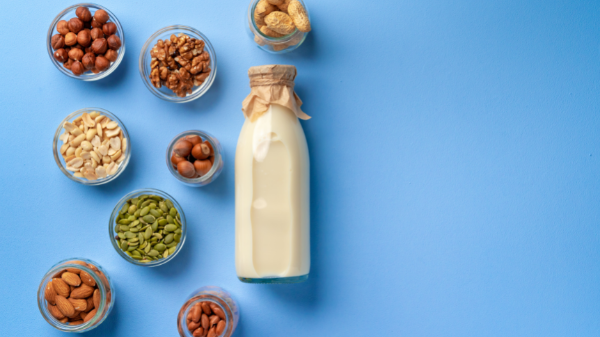It’s possible to milk just about anything these days.
Cashews? Yes. Almonds? Totally. Soy? Why not! Oats? Since forever!
Honestly, do you even remember the time these items were not linked to milk? No? Thought so.
Once you get over this shock that just about every nut and grain can be milked – you’re left wondering which is the healthiest diary-free option in the market for you. With a ton of choices, it’s hard to pick just one. Scroll below for a complete nutritional breakdown of all the options at your local barista:
Soymilk
Calorie: 80 – 100kcal
Although not a new form of beverage, it has been used in popular diet trends for a while now. Traditionally made by soaking soybeans overnight before grinding the beans with water, it is naturally low in saturated fats and cholesterol. It’s a good source of protein, potassium, and even calcium (when fortified with it). It is also suitable for people with estrogen deficiency (because of its natural phytoestrogen compound) and lactose intolerance.
Note: Not suitable for people with soy allergy
Almond milk
Calorie: 30 – 60kcal
Made by blending almonds and water before filtering it to separate the solids, this plant-based milk has a surprisingly creamy texture and a flavourful nuttiness to it. Although almonds are a solid source of protein, almond milk contains very little of it. It’s USP is that it’s low calorie, has a splash of calcium, Vitamin A and D.
Note: Not suitable for persons with nut allergy
Cashew milk
Calorie: 60kcal
Whip it up in your homemade latte, masala chai or make a matcha for a midday spike of L-theanine, you’ll be thanking us later. Like almond milk, cashew milk is low in calories and doesn’t cause blood sugar levels to spike. It’s a great source of zinc, copper and magnesium but the milk lacks a lot of the essential nutrients found in regular dairy milk such as calcium, unless of course it is fortified with it.
Note: Not suitable for people with nut allergies
Coconut milk
Calorie: 230kcal
Say hello to your keto diet friend! Unlike the thicker coconut milk typically used in cooking, this beverage is made by diluting the coconut cream. It’s got a pretty typical tropical taste to it – naturally high in fats, lower in carbohydrates but doesn’t contain any vitamins, calcium or protein like your cow, nuts or grain-based milk. The upside though, the creaminess and high fat content keeps you fuller for longer and lowers your bad cholesterol. Watch out for the calories, they vary tremendously from brand to brand.
Note: Contains fermentable carbohydrates that can cause digestive issues
Oat milk
Claorie: 130kcal
We saved the best for the last. We’re definetly oat milk’s #1 fan here. It’s creamy, thick, tasty and blends perfectly with coffees and smoothies, what’s not to love, really? Possibly the best plant-based milk option out of the bunch and a great choice if you have lactose intolerance, soy or nut allergies. Made by simply blending rolled oats with water and straining into a thinner cream-like beverage – it’s a good source of vitamins, minerals and beta-glucans, a soluble fiber that promotes cardiovascular benefits.
Note: Good for people with lactose intolerance, nut and soy allergy or digestive problems. Lower in protein so gym-goers watch-out
Read similar articles by clicking on the titles below:
Natural Sweeteners: Healthier alternatives to refined sugar
Five guilt-free desserts to add to your diet
Salad Daze: Do’s and don’ts of veganism



